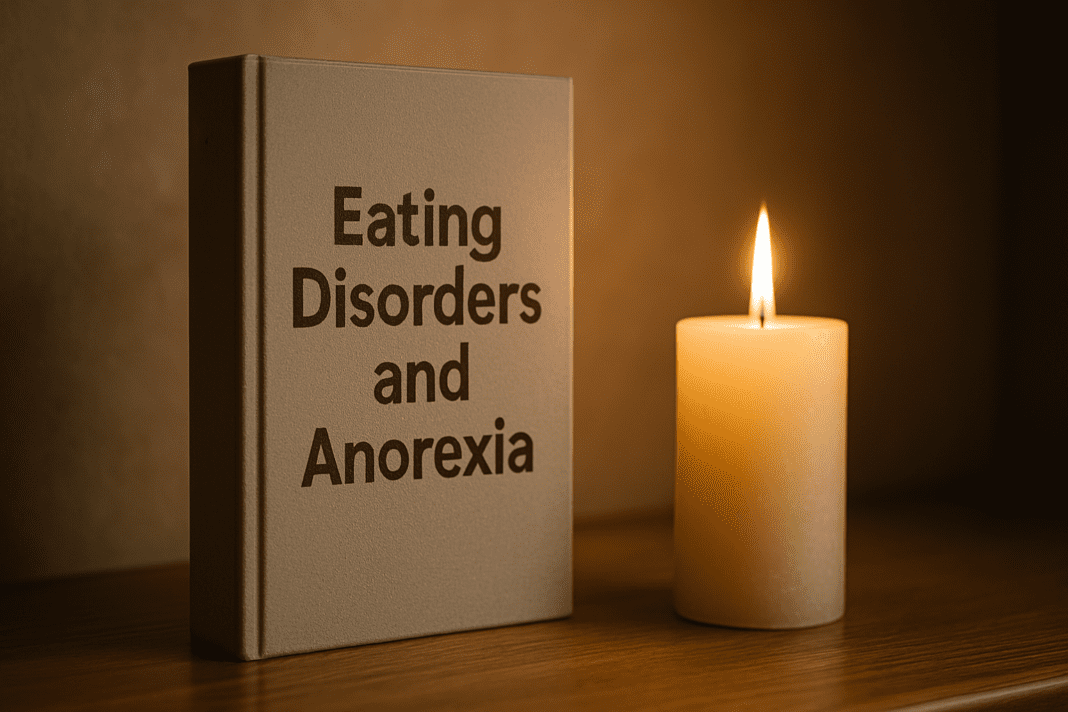Eating disorders represent some of the most complex and emotionally charged conditions in the landscape of mental and physical health. While anorexia nervosa is among the most widely recognized, it exists within a broader spectrum that includes bulimia, binge eating disorder, and other specified feeding or eating disorders (OSFED). These illnesses often affect individuals not just physically but psychologically, emotionally, and socially. Recovery is rarely linear and frequently demands a multidisciplinary approach that combines medical care, nutritional guidance, therapy, and sustained emotional support. In recent years, literature has emerged as a powerful and accessible tool that can offer clarity, comfort, and evidence-based insights for those navigating recovery. Whether written by clinicians, researchers, or survivors, books about eating disorders and books about anorexia can serve as invaluable resources on the journey to healing.
You may also like: How to Stop Emotional Eating and Regain Control: Mindful Nutrition Strategies That Support a Healthier Lifestyle
Understanding the Role of Literature in Eating Disorder Recovery
Books have long served as tools for learning, self-reflection, and empathy-building. In the context of eating disorders, expert-authored books provide critical insight into the biology, psychology, and sociocultural dynamics that underlie these conditions. Unlike fleeting digital content, well-researched books invite deep engagement and foster a sense of trust and continuity. For many readers, a thoughtfully written book can feel like a conversation with a trusted mentor or a compassionate guide.
When discussing books about anorexia and related disorders, it is essential to distinguish between those grounded in scientific research and those offering anecdotal accounts. Both have value. Clinical texts authored by psychiatrists, psychologists, and dietitians provide evidence-based guidance for diagnosis, treatment options, and therapeutic interventions. At the same time, memoirs offer powerful glimpses into lived experiences, validating the feelings of those currently struggling and providing hope through stories of recovery. When curated responsibly, this literature becomes an integral part of a broader recovery toolkit.
Why Books About Eating Disorders Matter for Mental and Nutritional Health
The recovery process from an eating disorder is multi-faceted. Beyond therapy and clinical intervention, individuals often grapple with persistent emotional distress, distorted body image, and deeply rooted nutritional misconceptions. Books that address these dimensions can help bridge the gap between clinical care and personal empowerment. By contextualizing eating behaviors within frameworks of trauma, perfectionism, family dynamics, and cultural pressure, these texts provide a more comprehensive view of what sustains disordered eating and how recovery can take shape.
Moreover, books about eating disorders frequently offer structured programs or self-help tools rooted in cognitive-behavioral therapy (CBT), dialectical behavior therapy (DBT), and intuitive eating frameworks. These resources help individuals develop healthier relationships with food, challenge negative self-talk, and reframe distorted beliefs. For example, a reader learning about the principles of intuitive eating may begin to see food not as an enemy, but as nourishment, paving the way for nutritional healing that supports both the body and mind.

Exploring Books About Anorexia from a Clinical Perspective
When narrowing the focus specifically to books about anorexia, clinical literature remains especially important due to the severity and medical risks associated with this condition. Anorexia nervosa carries the highest mortality rate among psychiatric disorders, often due to cardiac complications or suicide. Therefore, educational texts written by professionals must prioritize medical accuracy, compassionate language, and practical guidance.
Titles such as “Eating in the Light of the Moon” by Dr. Anita Johnston or “The Eating Disorder Sourcebook” by Carolyn Costin exemplify the kind of balanced, research-informed perspectives that are helpful to both patients and their support systems. These books explain how anorexia manifests in the brain and body, how treatment teams are assembled, and what recovery may look like in different phases. They also acknowledge the challenges of relapse and the importance of individualized care plans. These insights help demystify the recovery process while reinforcing the reality that anorexia is not a lifestyle choice but a serious illness requiring compassion and structure.
Memoirs and Personal Narratives: Lived Experience as a Healing Tool
While clinical books provide the “how” and “why” of eating disorder treatment, memoirs offer the emotional resonance that can make healing feel more attainable. Lived experiences reveal the inner dialogue of those who have struggled, making it easier for others to see their own thought patterns and emotions reflected in someone else’s story. Books like “Wasted” by Marya Hornbacher or “Life Without Ed” by Jenni Schaefer demonstrate how individuals have navigated denial, treatment resistance, family conflict, and eventually, the slow re-integration of healthy habits.
Memoirs are also essential for dismantling stigma. Eating disorders often carry a veil of shame, and this silence can exacerbate isolation. By speaking candidly about their experiences, survivors create safe emotional spaces for others to acknowledge their own suffering without fear of judgment. Moreover, memoirs frequently highlight the non-linear nature of recovery. Setbacks, relapses, and moments of ambivalence are portrayed not as failures, but as part of a larger, dynamic process. In doing so, these books foster resilience and validate the reader’s emotional complexity.
The Interplay Between Nutrition Education and Emotional Recovery
A recurring theme across both clinical texts and memoirs is the vital link between nutritional education and emotional recovery. Many books about eating disorders emphasize that re-nourishment is not merely about caloric intake, but about restoring trust in one’s body and relinquishing rigid food rules. Misconceptions about “good” and “bad” foods, compulsive exercise, or fasting rituals often stem from deeper emotional wounds. Addressing these beliefs requires both factual correction and emotional processing.
Books that explore intuitive eating or mindful eating offer powerful tools to replace diet culture with self-compassion. For example, the works of Evelyn Tribole and Elyse Resch provide readers with frameworks for recognizing hunger and satiety cues, understanding emotional eating triggers, and learning to eat without guilt. This kind of nutritional healing supports long-term recovery by fostering body attunement and emotional regulation. The psychological benefits of re-learning how to eat intuitively often extend far beyond meals, influencing self-esteem, identity, and interpersonal relationships.
Incorporating Books About Eating Disorders Into Treatment Plans
Healthcare providers increasingly recognize the therapeutic potential of bibliotherapy as a supplement to traditional treatment plans. By recommending specific books about eating disorders, therapists and dietitians can empower clients to engage with recovery material outside of clinical settings. This reinforces key concepts introduced in therapy and encourages independent reflection. Some practitioners even assign specific chapters or journaling prompts based on readings, integrating them into sessions to deepen the therapeutic process.
Importantly, not all books are created equal. Clinicians must be discerning in their recommendations, ensuring that books avoid triggering imagery or glamorization of disordered behaviors. Books should align with evidence-based practices and be tailored to the patient’s current stage in the recovery process. For example, an individual in early refeeding might benefit from a structured nutritional guide, while someone further along may find value in a memoir that explores identity and self-worth beyond the eating disorder. The diversity of available literature allows for nuanced and flexible treatment planning.
How Families and Caregivers Can Benefit from These Books
Eating disorders profoundly affect not just the individual but their entire support network. Families and caregivers often struggle to understand the illness, navigate difficult conversations, and provide appropriate support without enabling harmful behaviors. Books about anorexia written specifically for loved ones offer a lifeline. Titles like “Help Your Teenager Beat an Eating Disorder” by James Lock and Daniel Le Grange provide step-by-step guidance on how to communicate effectively, set boundaries, and foster recovery-focused environments.
These books can also help families process their own emotions. It is not uncommon for caregivers to experience guilt, frustration, or helplessness. Literature that acknowledges these feelings and offers coping strategies can reduce burnout and improve familial resilience. Furthermore, understanding the medical and psychological underpinnings of eating disorders equips families to advocate for appropriate care, recognize warning signs of relapse, and celebrate progress without overemphasizing weight or appearance. In this way, education fosters empathy and transforms anxiety into informed action.

Navigating Diversity, Identity, and Inclusivity in Eating Disorder Literature
Historically, eating disorders have been portrayed as affecting primarily young, white, affluent women. This limited narrative has excluded many who do not fit this mold, leading to misdiagnoses and inadequate treatment for people of color, men, LGBTQ+ individuals, and older adults. Fortunately, a new wave of literature is challenging these stereotypes and expanding the conversation.
Books about eating disorders now increasingly highlight the intersectionality of identity and illness. Works like “Sick Enough” by Dr. Jennifer Gaudiani acknowledge the medical complexities of eating disorders across body sizes and demographics, while newer memoirs offer perspectives from underrepresented voices. This inclusivity is crucial for promoting early intervention and culturally competent care. Readers from marginalized backgrounds often report feeling unseen in traditional narratives; inclusive literature affirms their experience and reinforces that recovery is possible for everyone, regardless of their identity.
Choosing the Right Book: Practical Tips for Readers
With so many books about anorexia and eating disorders available, choosing the right one can feel overwhelming. Start by clarifying your goals: are you seeking medical information, emotional validation, recovery strategies, or a sense of connection? If you’re early in the recovery process, look for books recommended by treatment professionals or published by reputable sources. Pay attention to publication dates, as the understanding of eating disorders has evolved significantly in recent years.
Also consider the author’s background. Books written by credentialed professionals offer clinical accuracy, while those written by survivors provide emotional depth. Ideally, a combination of both types of books creates a more holistic understanding. Reading reviews and summaries can also help assess whether the tone, content, and approach align with your needs. Importantly, remember that no single book holds all the answers. Recovery is a personal journey, and literature is one of many valuable tools along the way.

The Ongoing Impact of Books About Anorexia in a Digital Age
In an era dominated by fast-paced media and ever-changing wellness trends, the enduring relevance of books about eating disorders may seem surprising. Yet the deliberate pace and immersive quality of reading can be uniquely therapeutic. Books allow readers to slow down, absorb complex ideas, and revisit material as needed. In contrast to social media, which often promotes unattainable beauty standards and misinformation, books provide a counterbalance grounded in expertise and authenticity.
Moreover, digital versions of these books increase accessibility. E-books and audiobooks make it easier for individuals to engage with recovery literature on their own terms. Some platforms even offer interactive components, such as guided meditations, journaling exercises, or community forums tied to the book’s content. This hybrid approach merges the depth of traditional literature with the flexibility of modern technology, broadening the reach of recovery-oriented education.
Frequently Asked Questions (FAQ) on Books About Eating Disorders and Anorexia
What makes certain books about eating disorders more effective than others in supporting recovery?
The most effective books about eating disorders are those that combine medical accuracy, psychological insight, and emotional relatability. What sets these books apart is not only the credentials of the author but also how they present information in a digestible and non-triggering way. Books that include a blend of clinical expertise and narrative empathy tend to resonate more deeply, especially when they incorporate exercises, reflection prompts, or therapeutic frameworks. Readers should look for books that reflect current research in eating disorder treatment, including newer approaches like trauma-informed care and body neutrality. Effectiveness also increases when the book acknowledges diverse lived experiences rather than promoting a one-size-fits-all recovery journey.
Are books about anorexia suitable for individuals who are still in the early stages of recognizing their disorder?
Yes, but with careful selection. For someone still grappling with the reality of their illness, it’s essential to choose books about anorexia that are gentle in tone and avoid sensationalism. Introductory books that explain symptoms and emotional patterns without overwhelming the reader can offer a soft entry point into understanding the disorder. Some people may respond better to memoirs that subtly mirror their own experiences, helping them feel seen without directly confronting them. Clinically grounded books that explain the biological and psychological underpinnings of anorexia, without judgment or graphic detail, are especially helpful for building early insight.
Can books about eating disorders be helpful for individuals who have recovered but want to prevent relapse?
Absolutely. Books about eating disorders can be instrumental in post-recovery maintenance. Many individuals find that reading reinforces previously learned skills and provides motivation to stay aligned with their recovery goals. Books that focus on long-term emotional resilience, intuitive eating, and navigating triggers in social or professional environments can be particularly useful. Even after formal treatment ends, literature can serve as a quiet companion that reminds readers of their values and progress. Relapse prevention strategies featured in many contemporary recovery books also help readers build mental agility around stressors and setbacks.
What role do books about anorexia play in reducing stigma in communities and workplaces?
Books about anorexia can serve as powerful tools for education and empathy-building outside clinical contexts. When people read personal narratives or scientifically grounded explanations of anorexia, they begin to understand the disorder as a multifaceted health issue rather than a lifestyle choice or vanity-driven behavior. In workplaces, book clubs or wellness seminars centered around these books can foster open dialogue and reduce harmful misconceptions. Literature can also provide language for allies and advocates to speak up in support of those struggling. By normalizing conversation through books, communities become better equipped to recognize warning signs and offer compassionate support.
How can books about eating disorders support individuals in marginalized communities?
Representation matters deeply in recovery literature. Books about eating disorders that feature BIPOC, LGBTQ+, disabled, or male voices disrupt the stereotype that these conditions affect only one demographic. Inclusive books validate the experiences of readers from marginalized groups and can reduce barriers to seeking help. Additionally, some books now explore the intersections of cultural identity, trauma, and disordered eating, offering context-specific insights that resonate more authentically with underrepresented readers. By making these stories visible, literature helps create a more inclusive mental health landscape and challenges the systemic gaps in diagnosis and care.
Can reading books about anorexia complement therapy or nutritional counseling?
Reading books about anorexia can be a valuable adjunct to professional treatment. Many therapists and dietitians recommend specific titles to reinforce topics discussed in sessions, such as cognitive distortions, meal planning, or emotional regulation. When integrated into therapy, books can extend the conversation beyond the office, encouraging self-reflection and preparation for upcoming appointments. For example, a patient might read about body image struggles one week and then bring their thoughts to therapy for deeper exploration. Literature can also help clarify confusing concepts or reframe challenges in a new light, enhancing the therapeutic alliance and empowering the reader.
How can caregivers and family members use books about eating disorders to support their loved ones?
Books about eating disorders provide caregivers with the tools and vocabulary to engage in more informed, compassionate conversations. They can clarify why certain behaviors occur and guide families in responding constructively rather than reactively. For instance, literature can explain why comments about appearance might reinforce disordered thinking, even when well-intended. Books also prepare caregivers for the emotional toll of supporting someone through recovery, offering strategies for self-care and boundary-setting. When families read together or share insights from books, it can strengthen their relational foundation and create a unified approach to healing.
Do books about anorexia address the role of social media in disordered eating?
More recently published books about anorexia are beginning to address the influence of digital culture, especially the curated images and harmful trends found on platforms like Instagram and TikTok. These books explore how comparison cycles and algorithm-driven content can trigger or perpetuate disordered eating patterns. Some authors provide specific tips on setting boundaries with technology, curating healthier feeds, or engaging with digital communities that promote recovery rather than restriction. Others delve into the psychological mechanisms behind online validation and how it intersects with self-worth. This digital literacy component is vital for younger readers who are deeply embedded in social media ecosystems.
Are there any emerging trends in the publishing world related to books about eating disorders?
Yes, the publishing landscape is evolving to include more intersectional, trauma-informed, and neurodiversity-affirming perspectives. Books about eating disorders are increasingly incorporating insights from fields like somatic therapy, mindfulness-based interventions, and trauma neuroscience. There’s also a growing trend toward hybrid formats, such as workbooks that combine memoir and guided journaling, or interactive e-books that link to video resources. Self-publishing has enabled a wider range of voices, especially those from marginalized communities, to share their stories without gatekeeping. These innovations make the literature more accessible, adaptable, and reflective of the diversity within the recovery community.
Can books about anorexia help people who don’t have the disorder themselves but struggle with disordered eating habits?
Absolutely. Books about anorexia often touch on themes that are relevant to anyone with a complicated relationship with food, body image, or control. Readers who don’t meet diagnostic criteria for anorexia may still find these books enlightening, especially when exploring underlying emotions or coping mechanisms. By reading about the deeper psychological roots of restrictive behaviors, individuals can better understand their own patterns and seek appropriate support before symptoms escalate. These books also promote body neutrality and intuitive eating, offering alternatives to diet culture that can benefit anyone looking to rebuild trust with their body. The emotional and nutritional insights they provide are valuable across the spectrum of disordered eating.
A Final Word on Healing Through Reading: The Value of Books in Recovery
Books about eating disorders and books about anorexia are more than just informational texts; they are companions on the long road to healing. Whether rooted in clinical research or personal reflection, these works validate suffering, illuminate treatment paths, and offer hope. They can demystify complex medical and psychological concepts, empower readers with practical strategies, and nurture empathy in families and communities. Most importantly, they remind those struggling that they are not alone and that recovery is not only possible but worth pursuing.
In a world where misinformation and stigma still cloud the conversation around eating disorders, well-crafted literature stands as a beacon of clarity and compassion. For those seeking to understand, support, or overcome these conditions, the right book can open a door that leads not only to insight but to transformation. The journey of recovery often begins with a single step—and sometimes, that step is turning the first page.
eating disorder recovery books, anorexia recovery journey, mental health and nutrition, intuitive eating guide, mindful eating practices, body image healing, therapy for eating disorders, emotional eating recovery, disordered eating support, nutritional rehabilitation, self-help for anorexia, cognitive behavioral therapy for eating disorders, books on food and body image, healing relationship with food, overcoming food guilt, trauma and eating disorders, psychological health and nutrition, eating disorder memoirs, recovery from restrictive eating, understanding eating behaviors
Further Reading:
Eating Disorder Book Recommendations
Eating disorders recommended reading
Disclaimer
The information contained in this article is provided for general informational purposes only and is not intended to serve as medical, legal, or professional advice. While NewsHealthWatch strives to present accurate, up-to-date, and reliable content, no warranty or guarantee, expressed or implied, is made regarding the completeness, accuracy, or adequacy of the information provided. Readers are strongly advised to seek the guidance of a qualified healthcare provider or other relevant professionals before acting on any information contained in this article. NewsHealthWatch, its authors, editors, and contributors expressly disclaim any liability for any damages, losses, or consequences arising directly or indirectly from the use, interpretation, or reliance on any information presented herein. The views and opinions expressed in this article are those of the author(s) and do not necessarily reflect the official policies or positions of NewsHealthWatch.

